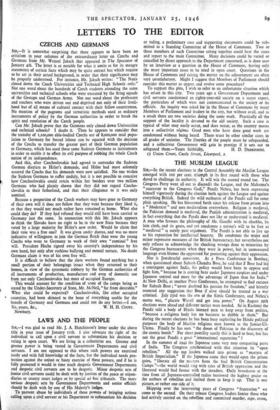LAWS AND THE PEOPLE
Sitt,—I was glad to read Mr. J. A. Hutchinson's letter under the above title in your issue of January uth. 1 also advocate the right of the individual to call upon a civil servant to substantiate his decision or ruling in open court. We are living in a collectivist era. Greater and greater power is being vested in Government Departments and civil servants. I am not opposed to this where such powers are exercised justly and with full knowledge of the facts, but the individual needs pro- tection against the unjust or hasty exercise of these powers, and if he is fully protected it would in time teach despotic Government Departments and despotic civil servants not to be despotic. Minor despotic acts of junior civil servants could be dealt with by justices of the peace or stipen- diaries or county court judges or by special ad hoc tribunals. The more serious despotic acts by Government Departments and senior officials should be dealt with by one of His Majesty's judges.
To prevent abuse by individuals of these powers of bringing actions calling upon a civil servant or his Department to substantiate his decision or ruling, a preliminary case and supporting documents could be sub- mitted to a Standing Committee of the House of Commons. Two or three members of such Committee sitting together could hear the cases and report to the main Committee. Many decisions could be varied or cancelled by direct approach to the Department concerned, as is done now by an interview or a question in the House of Commons, leaving only the more important cases to be tried in open court. Questions in the House of Commons and raising the matter on the adjournment are often very unsatisfactory. Might I suggest that Members of Parliament should consider this matter as urgent and evolve some procedure?
To support this plea, I wish to refer to an unfortunate situation which has arisen in this city. Two years ago a Government Department and civil servants condemned an eighty-year-old society on a secret report, the particulars of which were not communicated to the society or its officials. An inquiry was asked for in the House of Commons by many Members of Parliament and leaders in the city, but without avail, and as a result there are two societies doing the same work. Practically all the support of the locality is devoted to the old society. Such a case is typical of what may easily occur, and does occur, as the country moves into a collectivist regime. Good men who have done good work are condemned without being heard. There must be other similar cases in all grades of societies. The liberties of the people must be safeguarded, and a collectivist Government will gain in prestige if it sets out to safeguard them.—Yours faithfully, H. D. DARBISHIRE. 13 Union Court, Castle Street, Liverpool, 2.






























 Previous page
Previous page